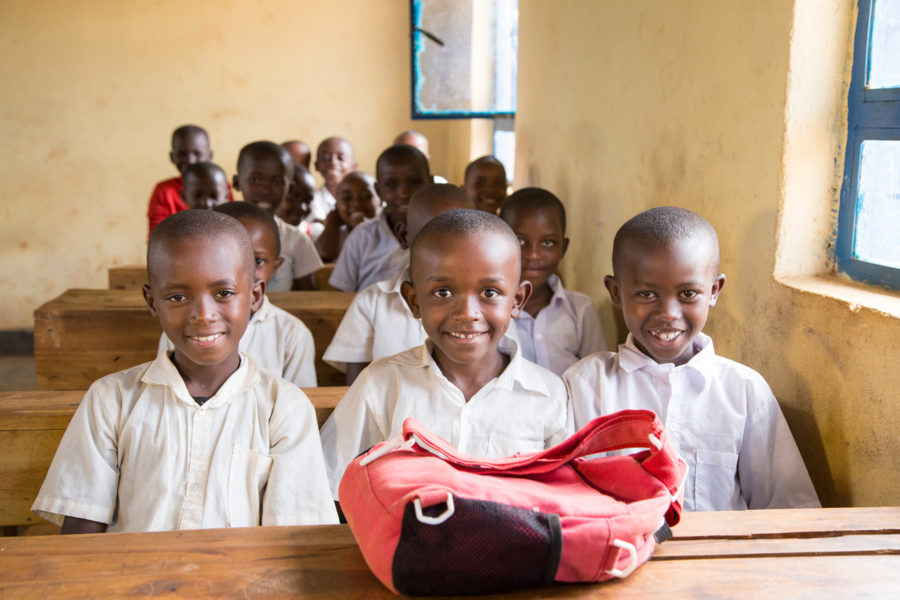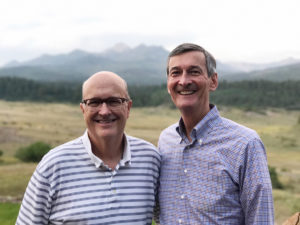
Elevating Education for Children in Developing Countries
About five years ago, when Doug MacGray of Wilmington, Del. returned from a family vacation in Punta Cana, Dominican Republic, he began to wonder if there might be something meaningful he could do to give back to the country.
A certified financial planner, non-practicing attorney and president of Stonecrop Wealth Advisors, LLC in Chadds Ford, Pennsylvania, MacGray sends a weekly e-mail to clients, professional contacts, friends and family. “I always like to include something personal in these e-mails,” explained MacGray, who, upon his return, mentioned the vacation and thoughts about the Dominican Republic.
The following day, a longtime friend and attorney, David Wilks, contacted him about Edify. Wilks, who had read the e-mail, explained to MacGray that Edify partners with schools in developing countries to provide training, low-cost loans, education technology and a variety of supportive measures. The Dominican Republic was one of these countries. Soon after, he, Wilks and five other men formed a Delaware Valley group to provide support to this global non-profit. (Today, that group of financial partners—still growing—consists of about a dozen men and women).
About a year after that initial meeting, the men traveled to the Dominican Republic to see firsthand the impact of Edify’s efforts. Edify’s model is unique in multiple ways, including the fact that financial partners do much more than donate funds. They are integral to the success story, working one-on-one with school leaders and teachers, interacting with parents and students.
The group visited several schools and met with owners. “It was a life-changing event,” said MacGray. “Going to some of these incredibly poor areas and seeing these awesome schools doing so much in these tiny little spaces.” Many of the schools have little or no electricity; most don’t have Internet access. In one instance, they met the parents of a teacher who wanted to start a school. The parents donated their house so it could be used as a school. “That’s how dedicated some of these people are,” said MacGray. “It blows you away how much they do with so little.”

Edify’s Global Reach
According to Ryan King, Edify’s director of edification and philanthropy, since the organization was founded in 2009, they have partnered with 5,187 schools in 11 countries and reached 1.4 million children, kindergarten through 8th-grade. Edify employs a staff of about 75 worldwide; 25 are in the United States at a variety of locations. Each country has an office and staff. The U.S. office is in San Diego where King works.
“Globally, in the developing world, there is an extreme lack of quality education being provided by the local government,” said King. “In response to that, there are some amazing local people—moms and dads, pastors, educators, community workers—that start low-fee, Christ-centered schools.” Class sizes average about 35 students compared to 75 to 100 in public schools. Edify is a Christian organization, explained King, yet children of all faiths attend the schools. “In a lot of these countries, poverty exists in part due to corruption, dishonesty and hate,” he said. Edify elevates the quality of education and helps schools to become self-sustaining. Through microfinance (low-cost loans), he explained, small business loans of under $1,000 have helped families start schools.
“Edify is part of a global education revolution causing incredible transformation and shattering cycles of poverty in incredibly impoverished communities,” said King. The low-fee, independent schools are strengthened by Edify’s business and curriculum training, low-cost loans and education technology integration.
King described what is meant by “Christ-centered” partner schools: “Our hope is to impart character, honesty, integrity and love.”
Co-Founders | Were Inspired
Edify’s beginnings were hatched over a decade ago when Chris Crane, board chair and co-founder, attended a John Templeton Foundation conference where author James Tooley talked about his book, “The Beautiful Tree: A Personal Journey into How the World’s Poorest People Are Educating Themselves.” Tooley described his seven-year journey discovering low-fee schools in developing countries and underscored the impact of microfinance. Crane was so inspired, that he and Tiger Dawson, CEO and co-founder, decided to utilize their microfinance backgrounds to make a global impact.
Their efforts began in the Dominican Republic and Ghana, where they met with microfinance companies, training organizations, ministers of education and low-fee Christ-centered schools. Country by country, the organization grew. The model, explained King, has proven uplifting for children, proprietors, parents and teachers.
Amy Hulst, an Edify content writer, noted that in the developing world, the majority of teachers don’t have more than an 8th-grade education. There are no requirements or educational standards like those in the United States. And the dropout rate is high for children; most don’t make it to middle school. “Edify helps train the teachers,” said Hulst. “We improve their knowledge of learning how to teach.”
Pam Hackett, a pediatric physical therapist and co-founder/managing partner of Pediatric Therapeutic Services Inc. (PTS) of Conshohocken, has partnered with Edify for five years. She has traveled to the Dominican Republic and Guatemala and trained hundreds of teachers on strategies to support children with special needs. Training encompasses alternative instructional strategies and practical skills utilizing pediatric therapies: physical, occupational, speech and behavioral. In some cases, training may be as simple as teaching a teacher how to instruct a child to hold a pencil. But it has made a world of difference and enabled teachers to teach across a range of abilities.
PTS serves children with special needs in school systems throughout the Greater Delaware Valley. “Part of the mission of PTS is to empower teachers to better be able to care for children with special needs so they can stay in the regular classrooms,” said Hackett of Media, Pennsylvania. In fact, the company has donated hundreds of in-service training to area schools, PTS clients.
So when the opportunity arose to support Edify in countries where pediatric therapists and in most cases, special education services, don’t exist, Hackett felt driven to help. She took the same effective training methods used throughout the Delaware Valley and adapted them to Edify partner schools. She had previously donated training services to schools in India for a decade, an extremely rewarding experience.
Hackett learned of Edify’s mission through her husband, Nick Hackett, a financial partner in the organization. “They run Edify in a very sustainable way that really honors the local people,” she said, adding that a beautiful partnership has evolved as a result of the training. Her passion has caught on. Educators from the region, such as Leigh Ann Ranieri, Ed.D., of the West Chester Area School District, have collaborated with Hackett to design content and strategies for effective special education.
Most recently, in January 2020, Hackett trained 100 teachers in Guatemala. Because of the lack of teacher education, she explained that students with special needs are often viewed as problem children. Teachers describe these students as disruptive with behavioral issues and poor performance on tests.
“There’s a lot of frustration on the part of the teachers because they have no training in how to recognize a disability,” said Hackett. For example, when they see a child with autism who runs out of the classroom, they perceive him/her as having a behavioral problem. Once they are taught the reasons behind such behavior, perceptions shift. Hackett calls the shift transformational. “They (the teachers) don’t see them as a problem; they see them as a child who has a problem that needs their help,” she said. “Understanding and compassion is the foundation for making real changes in these schools.”
Hackett said that many teachers cry at the trainings. Many can’t wait to go back to their classrooms.
“Edify has certainly changed my life,” said Hackett. “Some of these schools don’t have plumbing; many have limited electricity. “There’s a whole world out there that needs help. It’s amazing how much you can do even when there are very limited resources.”
Visit www.edify.org for more information.

